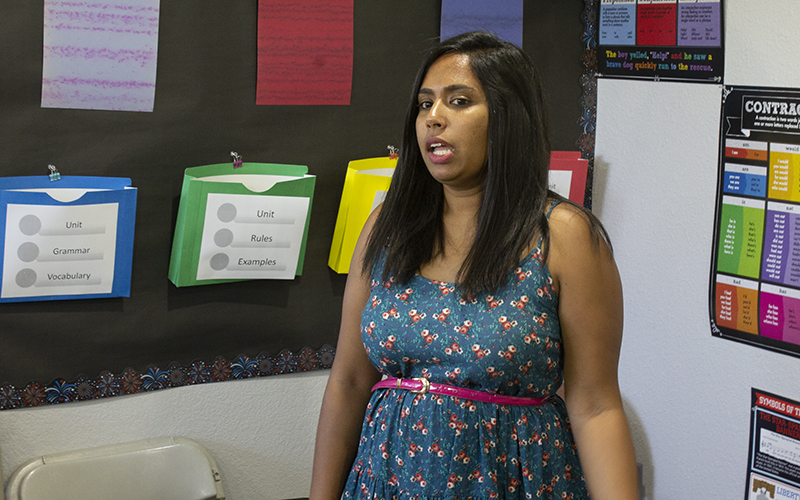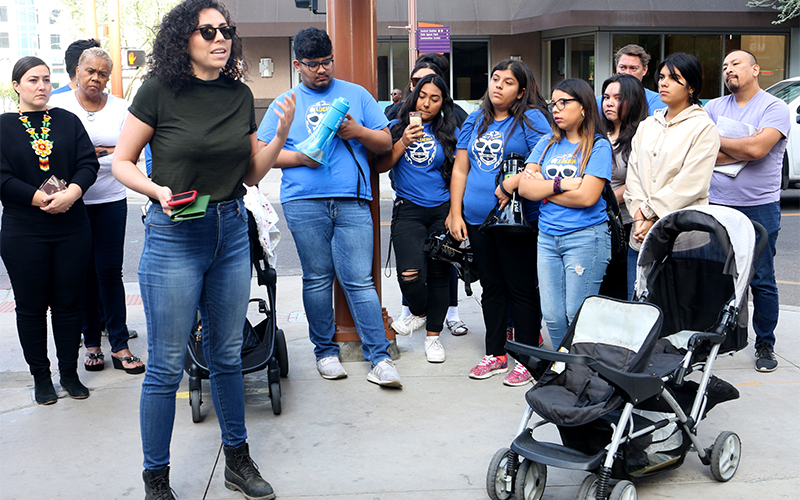
Stephanie Figgins, spokesperson for Trans Queer Pueblo, said a trans woman was arrested at a Phoenix light rail station for not having a ticket and is currently being detained for deportation. (Photo by Annika Tomlin/Cronkite News)
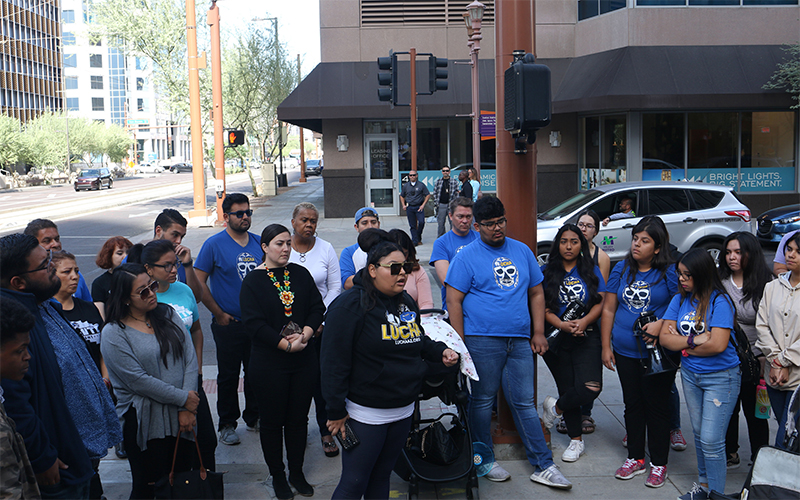
Gina Mendez, a community organizer, notes law-enforcement confrontations with riders on public transit elsewhere in the country. “Within the past month, we’ve seen an increase in police, an increase of security guards, we’ve seen an increase of people being criminalized for poverty,” she says. (Photo by Annika Tomlin/Cronkite News)
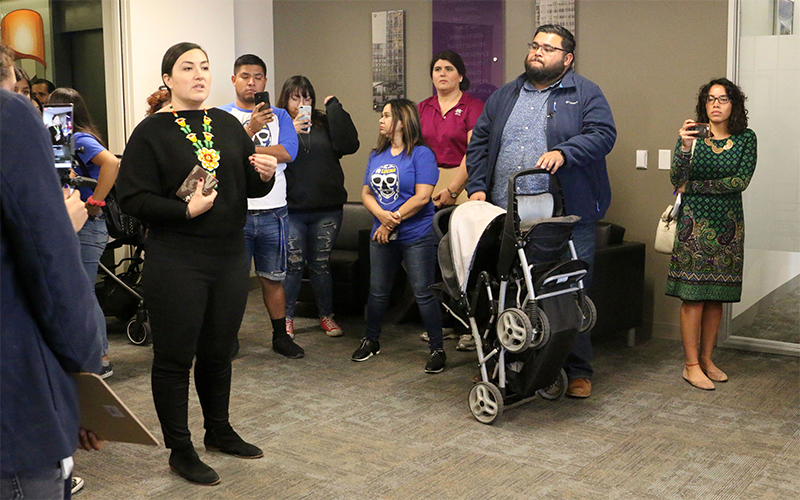
Alejandra Gomez, co-executive director of LUCHA, left a stroller at Valley Metro offices in downtown Phoenix to remind them of a mother who was with her children when authorities detained her. (Photo by Annika Tomlin/Cronkite News)
PHOENIX – Mitzi Castro hears the light rail train pass by her home every 15 minutes, a grim reminder, she said, of her experience on Wednesday, when Phoenix police stopped her because she hadn’t validated her $4 light rail ticket.
That confrontation, she said, could have led to her detention and deportation to Mexico.
On Friday, the immigration advocacy group LUCHA (Living United for Change in Arizona) led a protest of about 30 people at the Valley Metro office downtown, saying the transit system doesn’t support the poor and people of color – who make up the bulk of its riders. They demanded Valley Metro stop working with Phoenix police on fare payment crackdowns. The organization also launched an online portal to track complaints against authorities.
Castro, who works for LUCHA, said she feels uncomfortable every time she hears the light rail. The sound is unavoidable.
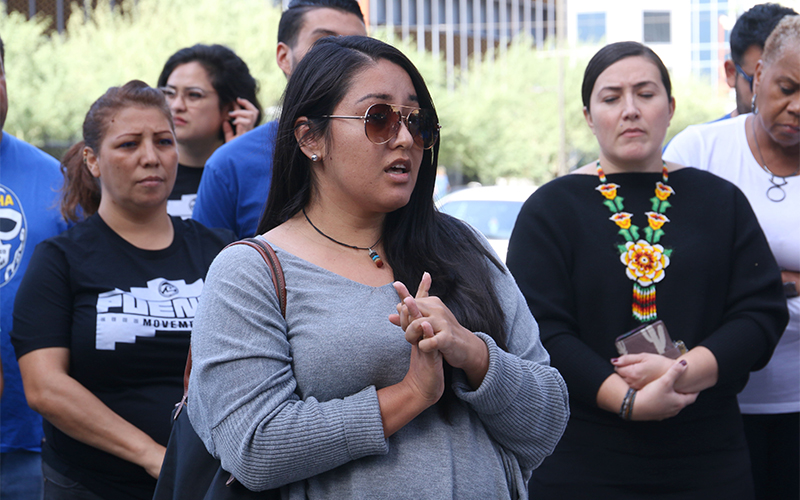
Mitzi Castro talks about being stopped by Phoenix police at a light rail station because she did not validate her ticket before getting on a train. She still is traumatized every time she hears the light rail pass by her home. Phoenix police say in a statement a woman was arrested for not giving her date of birth – needed for a citation for “fare infraction” – but released minutes later after providing that information. (Photo by Annika Tomlin/Cronkite News)
Castro said one officer told her, “We are the police, you’re supposed to feel safe.” Still, she said, the officers handcuffed her and threatened to arrest her. She started crying as she recounted the story.
Castro said her family relies on her income from LUCHA, where she works with small business owners of color, and she has an ill relative who would suffer if Castro were deported.
“My family would be forced into debt and my sick family member could die. This is the reality that could have come to fruition, all over a $4 fare,” Castro said.
Phoenix police, in a statement Friday, said they conducted a two-hour inspection of light rail fares on Wednesday. The statement does not mention Castro by name but says police had a nine-minute encounter with “31-year-old woman (who) was found to be in violation of the fare requirements” and was “escorted off the light rail.”
The woman provided her name but not her date of birth, which police said was necessary for the citation. She was handcuffed and detained but released after providing her birth date and receiving the citation.
Phoenix police said they contacted about 750 people during the fare inspection and found about 10% percent had “fare infractions.” Two had felony warrants and six had misdemeanor arrest warrants.
Warning: These unedited videos, provided by Phoenix police, may make some viewers uncomfortable.
LUCHA officials say they established an online complaint system, where the public can upload footage of police interactions on light rail. The point is to seek accountability for police actions, the organization said.
Gina Mendez, a community organizer, pointed to law-enforcement confrontations with riders on public transit elsewhere in the country.
“Within the past month, we’ve seen an increase in police, an increase of security guards, we’ve seen an increase of people being criminalized for poverty,” Mendez said. “What happened at the BART station out in the Bay Area? You see what happened over there in New York? We’re dealing with police who arrest people for made-up reasons.”
LUCHA leaders say it’s time for Valley Metro to not work with police on fare payments.
Mendez described an incident several weeks ago across the street from LUCHA’s office where a mother was surrounded by four police cars, handcuffed and being frisked while her children looked on in tears.
Alejandra Gomez, LUCHA co-executive director, said members brought the woman’s stroller with them Friday and delivered it to Valley Metro’s downtown office as a symbol.
“This stroller right here belongs to a mom who was criminalized and arrested right across the street from my office,” Mendez said.
Maria Castro, the community organizer for the human rights group Puente Arizona, said she protested in solidarity with Mitzi Castro and anyone who has been criminalized in Arizona’s transportation system. She called the system flawed.
“If you are not a native English speaker, if you are not savvy with technology, you may have trouble understanding how to purchase a ticket,” Castro said. “This is a net to capture migrants, people who do not understand these systems. The police put them in deportation systems and use this as an opportunity to ask for IDs.”
Gomez expressed disappointment with Valley Metro for not talking with protesters.
“They didn’t even have the decency to have a decisionmaker come and have a conversation with us, ” Gomez said. “The people who the light rail is intended for, people who can’t afford a vehicle, people who are struggling to make ends meet – Valley Metro is calling the police on its riders.”
Valley Metro issued a statement before Friday’s protest, saying it works with local police departments to enforce light-rail station rules. Fare sweeps occur on occasion to encourage compliance.
“The crime suppression efforts on Nov. 13 were initiated by the Phoenix Police Department,” the Valley Metro statement says.
Gomez said she will be taking the conversation directly to Mayor Kate Gallego.

